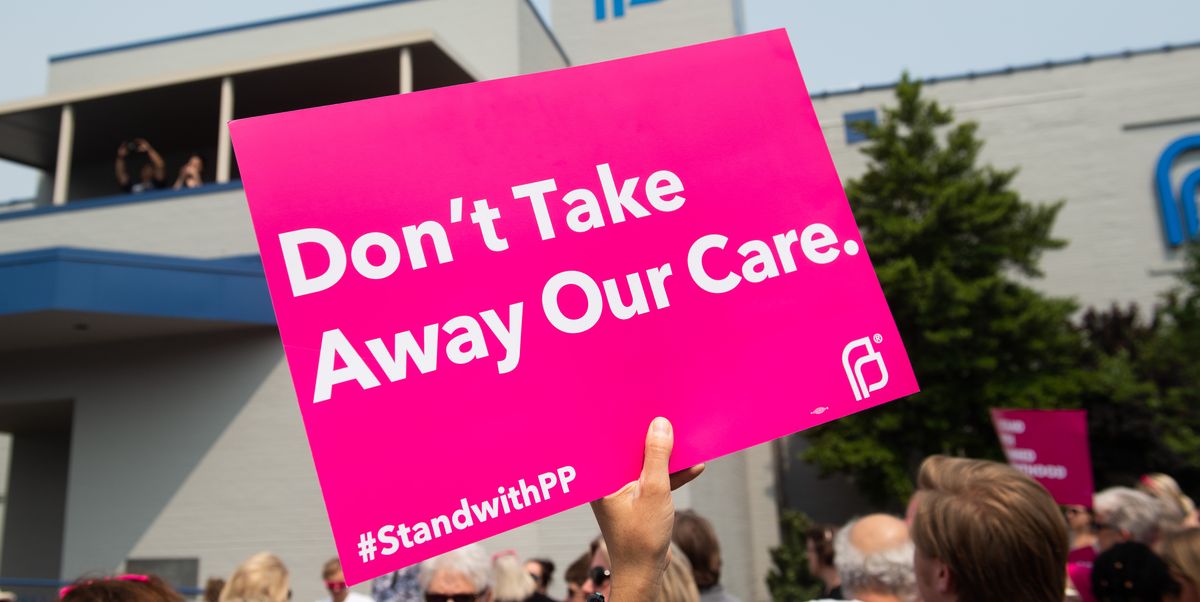Will Missouri be able to keep its one remaining abortion clinic open? That was the underlining question last week, when representatives from the state’s Department of Health and Planned Parenthood battled it out in a hearing that will decide whether the state will become the first in the nation to be without an abortion clinic since the passing of Roe v. Wade.
The hearing is over, but we won’t know the answer for months. How did we even get here? And what happens next? Here, a look into the state of abortion in Missouri.
How did we get here?
Back in May, Missouri’s Republican Governor Mike Parson signed a familiarly restrictive abortion law that said abortion would be banned after eight weeks of pregnancy, with no exceptions for rape or incest, mirroring similar abortion bans across the country. The ban was later blocked by a federal judge.
Then in July, according to NPR, state officials refused to renew Missouri’s only abortion clinic’s license, saying that clinic had violated state health regulations. However, Planned Parenthood filed a lawsuit, and the clinic was allowed to stay open while the case was pending. A hearing took place last week.
As NPR reports, “Planned Parenthood officials contend that regulators with the Missouri Department of Health and Senior Services have ‘weaponized’ the regulatory process, applying arbitrary and excessive scrutiny to the clinic in an effort to shut it down.”
The state already makes it difficult for patients to obtain abortions, including requiring patients wait 72 hours between their first visit and their abortion procedure.
What happened in the hearing?
During the last week of October, the state’s Administrative Hearing Commission considered the case between Parson’s administration and Planned Parenthood, the organization that operates the state’s last remaining clinic in St. Louis. Representatives from both Planned Parenthood and the state testified.
While the hearing is over, Planned Parenthood officials don’t anticipate a judgement until February 2020, at the earliest. Until then, abortion is still legal in the state, and Planned Parenthood will continue to provide abortion, as well as the organization’s other services.
So, what happens next?
To abortion advocates, the hearing in Missouri illustrates the various ways states are attempting to restrict abortion access, even while Roe in still in place. After testifying in last week’s hearing, Dr. Colleen McNicholas, chief medical officer of Planned Parenthood of the St. Louis Region and Southwest Missouri, told ELLE.com, “Attacks on abortion can come from multiple different places. They can come through the legislature, which is what most people are familiar with, passing laws to outright ban abortion. But also, it can come from regulatory bodies, and those are bodies that are overseen by politically-appointed individuals.”
“Missouri is a great example of how Roe doesn’t have to go anywhere for a state to lose access to abortion,” she continued. “What’s happening in Missouri is the foreshadowing to what’s going to be happening in other restrictive states, particularly if the bans continue to be blocked and enjoined… This is a great example of how you don’t need a conservative legislature or a conservative president for a state to outlaw abortion.”
While patients in Missouri wait to hear the judgement, steps are being taken to ensure abortion access in the midwest. Planned Parenthood of the St. Louis Region and Southwest Missouri just opened a huge new health center in Fairview Heights, Illinois—just 15 miles from St. Louis.
Looking ahead, Missouri will also hold an election for governor in 2020. There are several Democratic primary candidates already in the race, including Nicole Galloway, the current Missouri state auditor who called the eight-week abortion ban “a travesty for women.”
